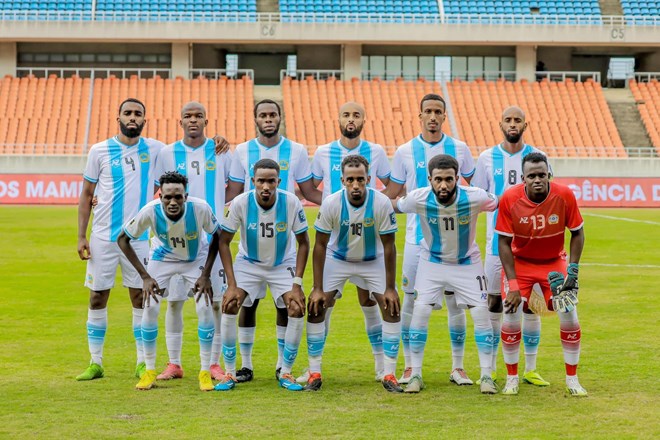
Saturday October 26, 2024

FILE - Somalia's national football team, the Ocean Stars, pictured in formation. The team has recently withdrawn from CHAN 2025 qualifiers due to financial constraints, highlighting ongoing challenges for Somali football on the international stage.
Mogadishu (HOL) — Somalia’s football federation has withdrawn from the African Nations Championship (CHAN) 2025 qualifiers, citing financial limitations as the primary cause. The announcement by Somalia Football Federation (SFF) General Secretary Yusuf Ahmed underscores the financial and operational challenges that have long hindered Somali football. “We decided to withdraw because of financial challenges,” Ahmed told Cecafaonline.com, explaining that the federation lacks the resources to support a national team for the upcoming qualifiers.
The withdrawal grants Burundi an automatic advancement in the CECAFA zone qualifiers, moving them directly into the next round, where they will face Uganda. CHAN 2025, slated for February and jointly hosted by Kenya, Uganda, and Tanzania, offers an important platform for showcasing local talent across Africa. The tournament restricts eligibility to players within their domestic leagues, making it a rare stage for regional players to gain international experience.
Somalia’s unexpected departure from the tournament highlights the complex financial situation within the SFF, which has long struggled to operate amid limited funding and structural setbacks. Established in 1951 and affiliated with FIFA since 1962, the SFF relies heavily on external support from FIFA, CAF, and occasional local sponsorships. However, these funds are stretched thin, covering only essential expenses while leaving little for player development or infrastructure improvements. The Somali government’s focus on addressing national security concerns means that sports development receives minimal budgetary support, and Somalia’s corporate sector offers few sponsorship opportunities.
The FIFA Forward Program allocates funds to developing football associations to support grassroots initiatives. Yet, much of this funding in Somalia has been directed to maintaining basic operations rather than fostering long-term growth. Additionally, the federation has relied on informal contributions from the Somali diaspora, an unreliable income source that highlights the SFF’s financial instability.
Beyond financial constraints, financial mismanagement and corruption allegations have further compromised the SFF’s credibility. Reports indicate that funds intended for grassroots programs and infrastructure were diverted to administrative costs, sparking concerns among players and former officials. Critics, including former players, have publicly called for greater transparency and accountability, citing unpaid salaries, inadequate training conditions, and minimal medical support as pressing issues.
In response, the SFF has announced reform plans to implement external audits and establish formal partnerships with the Somali diaspora to stabilize funding. These efforts could enable the SFF to address allegations and build trust within the Somali football community.
As Somalia steps back from the qualifiers, other CECAFA teams are set to proceed. Sudan will host Tanzania in Nouakchott, Mauritania, on October 27, while South Sudan will face Kenya at Juba National Stadium. Due to Djibouti’s lack of a CAF-approved stadium, they will play Rwanda in Kigali’s Amahoro Stadium. The return legs will be held in early November, with the second qualifying round set for December, allowing CECAFA to fill its four slots in the final CHAN lineup.